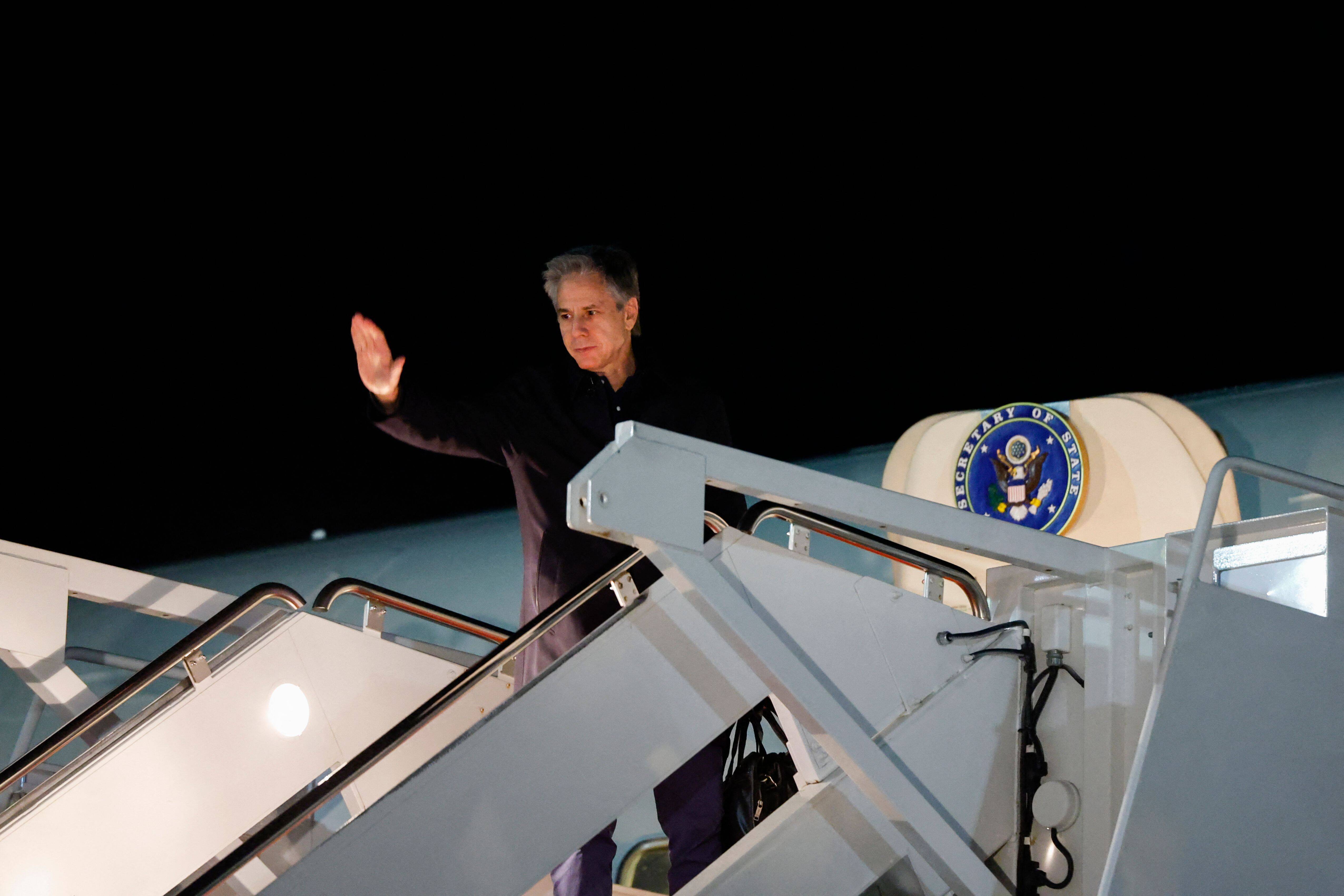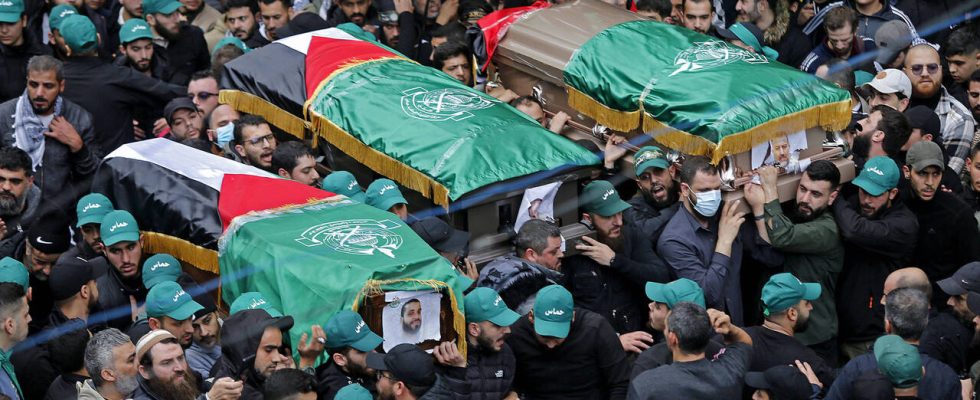Hezbollah assures that its response to the assassination of Hamas number two is “inevitable”
The leader of pro-Iranian Hezbollah in Lebanon said today that a response to the Israeli strike on his stronghold in the southern suburbs of Beirut that killed the number two of Palestinian Hamas was “inevitable” on “the battlefield “. The strike on the southern suburbs of Beirut “is serious and will not go unanswered,” warned Hassan Nasrallah in a televised speech, assuring that his movement would “respond” on “the battlefield.”
“The response is inevitable,” said the leader of Hezbollah, whose Islamist movement launches daily attacks against Israel from southern Lebanon. Saleh al-Arouri and six other Hamas officials and executives were killed Tuesday evening in a strike attributed to Israel against an office of the Palestinian Islamist movement, an ally of Hezbollah.
The head of German diplomacy visits the Middle East again
The German Foreign Minister will begin her fourth visit to the Middle East on Sunday since the start of the conflict between Israel and Palestinian Hamas, a ministry spokesperson announced on Friday. During her visit which begins in Israel, Annalena Baerbock is to meet her new counterpart Israel Katz and President Isaac Herzog, said spokesperson Sebastian Fischer during a regular German government press briefing in Berlin.
She must then hold discussions with the President of the Palestinian Authority Mahmoud Abbas as well as with his Palestinian counterpart, Riyad al-Maliki. Annalena Baerbock will then travel to Egypt where she will meet the head of Egyptian diplomacy, Sameh Shoukry, then to Lebanon. Sebastian Fischer did not specify who she should meet in this country.
Hamas Health Ministry reports 162 deaths in last 24 hours
The Palestinian Hamas Ministry of Health announced today that Israeli military operations in the Gaza Strip have left 22,600 dead since the start of the war on October 7, including 162 people killed in the last 24 hours.
Maersk diverts its ships to avoid the Red Sea
The Danish shipping giant Maersk announces that it will divert its fleet via the Cape of Good Hope to avoid the Red Sea where it has suspended all passage following attacks by Houthi rebels. “All Maersk vessels scheduled to transit the Red Sea and Gulf of Aden will be diverted […] in the near future,” the carrier said in a statement, specifying that “all available information confirms that the security risk (in the Red Sea, editor’s note) remains at a considerably high level.”
According to the IOM, more than 76,000 Lebanese have been displaced
76,018 people have been displaced in Lebanon almost three months after the start of violence on the border with Israel, according to a report from the International Organization for Migration, published Thursday.
The IOM indicates that nearly 81% of the displaced are currently housed with relatives. Only 2% are housed in 14 collective shelters spread across the south of the country, mainly in the coastal city of Tire and in the Hasbaya region, the agency adds. The rest of the displaced have rented apartments or settled in their second homes, in regions further from the border.
Cross-border violence has left 175 dead in Lebanon, including 129 Hezbollah fighters but also more than 20 civilians including three journalists, according to an AFP count. In northern Israel, nine soldiers and five civilians were killed, according to authorities.
Lice, scabies, chicken pox, diarrhea: UNRWA draws up an alarming assessment of the health situation in Gaza
On X, the UN agency in charge of Palestinian refugees is concerned about the “alarming spread of infectious diseases”, which is hitting the 1.9 million displaced hard.
📍#Gaza 1.9 million displaced people face alarming spread of infectious diseases🚨@WHO:
🔺180K people with upper respiratory infections
🔺+136K cases of diarrhea, 1/2 children under 5
🔺+55K cases of lice & scabies
🔺+5K chickenpox casesEach day, the situation deteriorates. pic.twitter.com/BuAEqOp7h8
— UNRWA (@UNRWA) January 4, 2024
Antony Blinken flew to the Middle East
The head of American diplomacy embarked Thursday evening for his fourth tour of the Middle East since the start of the conflict between Israel and Palestinian Hamas, where he intends to plead for increased aid for Gaza and ways to avoid conflagration in a tense regional context.
Antony Blinken expects difficult discussions during this new tour which will take him, in addition to Israel at the start of next week, to five Arab countries: Jordan, Qatar, the Emirates, Saudi Arabia and Egypt , as well as in the West Bank, headquarters of the Palestinian Authority, its spokesperson Matthew Miller told the press. He will first stop in Turkey before continuing his tour, scheduled to last until January 10.
The US Secretary of State will discuss “immediate measures to significantly increase humanitarian aid to Gaza”, where the humanitarian situation is described by the UN and NGOs as “catastrophic”.

Strikes on Gaza
During the night from Thursday to Friday, Israeli forces again increased strikes in the south and center of the Gaza Strip, where witnesses reported intense fighting.
For a “political solution for the whole of Palestine”
In an interview with Financial TimesPalestinian Authority Prime Minister Mohammed Shtayyeh called for a “political solution for all of Palestine” and not just Gaza.
“People are starting to talk about the ‘day after,’ about the PA ruling Gaza again,” but Israel “wants to politically separate the Gaza Strip from the West Bank,” he said. And added: “We have to look at the calendar and cross off 2024 (…) I do not think that Israel will leave Gaza very soon, I rather believe that Israel will create its own civil administration which will operate under the authority of his occupying army. Therefore, the question of the ‘day after’ is unclear (at the moment).”
Israeli defense minister unveils post-war Gaza plan
Israeli Defense Minister Yoav Gallant presented his first “post-war” plan for the Gaza Strip. He revealed the broad outlines of this plan to the press before submitting it to Benjamin Netanyahu’s war cabinet.
According to the plan, operations in the Gaza Strip “will continue” until the “return of the hostages”, the “dismantling of Hamas’ military and governance capabilities” and the “elimination of military threats in the Gaza Strip », Supported Yoav Gallant. After which another phase will begin, that of the “day after” the war according to which “Hamas will not control Gaza”.
“There will be no Israeli civilian presence in the Gaza Strip after the objectives of the war have been achieved,” declared Yoav Gallant, specifying that the Israeli army would however retain “its freedom of action” in Gaza. to curb any possible “threat”.
“The people of Gaza are Palestinians. Therefore, Palestinian entities will be in charge (of management) on the condition that there is no hostile action or threat against the State of Israel,” affirmed the Minister of Defense without specifying which of the Palestinians , should administer this territory of 2.4 million inhabitants.



